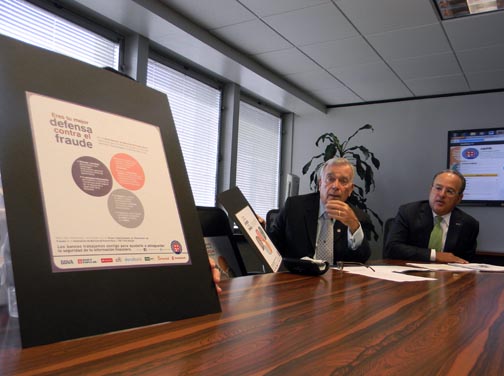Puerto Rico off US Treasury’s list of high-risk money-laundering jurisdictions

The island has taken steps to close the doors on illicit banking activity.
Recent actions by Puerto Rico’s central government and legislature have taken the commonwealth off the high-risk list in the U.S. Department of the Treasury’s 2024 National Money Laundering Risk Assessment, Gov. Pedro Pierluisi said following a meeting with Brian Nelson, the agency’s under secretary for Terrorism and Financial Intelligence (TFI).
Due to efforts by the Puerto Rico Office of the Commissioner of Financial Institutions (OCIF, in Spanish), led by Commissioner Natalia Zequeira, Puerto Rico “does not appear as a high-risk jurisdiction as the OCIF focused all its resources on strengthening its investigative unit, strengthening supervision of the entities under its regulation, and acting firmly against institutions that do not comply with applicable federal and state laws and regulations.”
Two mandates — Acts 44 and 45 of 2024 — were recently passed to improve, through the OCIF, the regulatory and supervisory framework of International Banking Entities (IBEs), as well as International Financial Entities (IFEs), to combat money laundering.
“It’s definitely positive news for Puerto Rico because it means that this financial sector that operates from the island is no longer considered nationally as a risk for the federal financial system, which means that these institutions have little by little been adapting their operations to comply with money laundering prevention regulations, and although there’s still a long way to go, compliance and latent risk no longer exist,” Zequeira said after a meeting with the governor, Nelson and leaders from the commercial banking sector.
“Of course, there’s always more to do but at least the doors of the financial system are open for their operation,” she said.
Nelson traveled to Puerto Rico to discuss key illicit finance issues including countering illicit fentanyl and narcotics trafficking, strengthening anti-money laundering and countering the financing of terrorism (AML/CFT) regulations, and promoting awareness among the Puerto Rican business community of beneficial ownership reporting information requirements. This is his first visit to the island.
“The Governor and I, joined by OCIF and the Puerto Rico Fiscal Agency, just finished a robust discussion on how to further build our partnership to support law enforcement and regulatory agencies in Puerto Rico, as well the impacts of Treasury’s regulatory reform agenda on Puerto Rico’s financial sector,” he said.
Following the meeting, Nelson said the agency’s oversight, including the 2024 National Money Laundering Risk Assessment released in February, “drive the types of reforms that we’re seeing here, and I think the passage of [Act] 273 is an important reflection of that.”
Meanwhile, the governor said they discussed the challenges that IBEs and IFEs are having in processing their transactions, as many U.S. banks have begun to minimize their exposure risks to these entities by closing their accounts.
Pierluisi said Nelson “is committed to continuing to provide us with support to ensure a banking system on the island that is always in compliance with the current rule of law. We will continue to work together, and do everything in our power, to eliminate the potential risks of terrorism and money laundering in Puerto Rico and thus protect our nation and consumers.”
Nelson, whose visit is slated to last three days, also met with top federal law enforcement partners on counternarcotics trafficking, including convening a roundtable with High Intensity Drug Trafficking Area (HIDTA) members to discuss the illicit fentanyl trade.
Nelson’s visit follows that of Andrea Gacki, the Financial Crimes Enforcement Network’s (FinCEN) director, to the island in February, where she hosted the first-ever FinCEN Exchange in Puerto Rico.
Puerto Rico represented risks in 2022
The U.S Treasury’s 2022 National Money Laundering Risk Assessment identified increased risks in Puerto Rico due to the existence of “cooperativas,” a type of credit union, and IBEs and IFEs, a catchall term that encompasses banks, broker-dealers, investment firms and other entities.
IBEs, IFEs and “cooperativas” — collectively Puerto Rican financial entities — which are chartered and licensed by territorial authorities, may present money laundering vulnerabilities to the U.S. financial system, with IBEs and IFEs being of particular concern because of their offshore banking business model.
In September 2023, FinCEN announced a $15 million civil penalty against the Bancrédito International Bank and Trust Corp. for violations of the Bank Secrecy Act — the first action of its kind.
Before that, in October 2022, the U.S. Treasury Department’s Office of Foreign Assets Control found Nodus International Bank Inc., an IFE in Puerto Rico, in violation of Venezuelan sanctions.
Reporters María Miranda and Michelle Kantrow-Vázquez contributed to this story.











